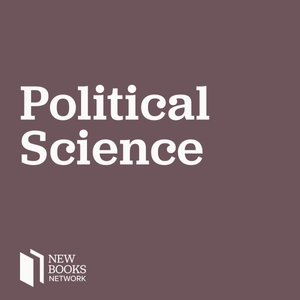
Democracy, Great Powers, and the Russia-Ukraine War. A Discussion with Stefan Wolff
01/17/24 • 26 min
How helpful is the democracy-authoritarianism binary when it comes to our understanding of contemporary conflict? What is the state of the Russia-Ukraine war? And how has it affected the great power rivalry between the United States and China? Listen to Stefan Wolff and Petra Alderman talk about the global struggle between democracy and authoritarianism, the state of the Russia-Ukraine war, and whether democracy is likely to lose out from the heightening tensions between the three great powers: the United States, Russia, and China.
Stefan Wolff is a Professor of International Security at the University of Birmingham. He is well-known for his research on the management of contemporary security challenges, especially in the prevention and settlement of ethnic conflicts and civil wars. He is also an expert on post-conflict state-building in deeply divided and war-torn societies and has written extensively on the geopolitics and geo-economics in Eurasia, including great power competition between Russia, China, and the West. He is a regular contributor to The Conversation and a co-founder of the Navigating the Vortex.
Petra Alderman is a Post-Doctoral Research Fellow in Leadership for Inclusive and Democratic Politics at the University of Birmingham and Research Fellow at CEDAR.
Please note that this episode was recorded in December 2023. All mentions of ‘this year’ refer to 2023 and mentions of ‘last year’ refer to 2022.
The People, Power, Politics podcast brings you the latest insights into the factors that are shaping and re-shaping our political world. It is brought to you by the Centre for Elections, Democracy, Accountability and Representation (CEDAR) based at the University of Birmingham, United Kingdom. Join us to better understand the factors that promote and undermine democratic government around the world and follow us on Twitter at @CEDAR_Bham!
Learn more about your ad choices. Visit megaphone.fm/adchoices
Support our show by becoming a premium member! https://newbooksnetwork.supportingcast.fm/political-science
How helpful is the democracy-authoritarianism binary when it comes to our understanding of contemporary conflict? What is the state of the Russia-Ukraine war? And how has it affected the great power rivalry between the United States and China? Listen to Stefan Wolff and Petra Alderman talk about the global struggle between democracy and authoritarianism, the state of the Russia-Ukraine war, and whether democracy is likely to lose out from the heightening tensions between the three great powers: the United States, Russia, and China.
Stefan Wolff is a Professor of International Security at the University of Birmingham. He is well-known for his research on the management of contemporary security challenges, especially in the prevention and settlement of ethnic conflicts and civil wars. He is also an expert on post-conflict state-building in deeply divided and war-torn societies and has written extensively on the geopolitics and geo-economics in Eurasia, including great power competition between Russia, China, and the West. He is a regular contributor to The Conversation and a co-founder of the Navigating the Vortex.
Petra Alderman is a Post-Doctoral Research Fellow in Leadership for Inclusive and Democratic Politics at the University of Birmingham and Research Fellow at CEDAR.
Please note that this episode was recorded in December 2023. All mentions of ‘this year’ refer to 2023 and mentions of ‘last year’ refer to 2022.
The People, Power, Politics podcast brings you the latest insights into the factors that are shaping and re-shaping our political world. It is brought to you by the Centre for Elections, Democracy, Accountability and Representation (CEDAR) based at the University of Birmingham, United Kingdom. Join us to better understand the factors that promote and undermine democratic government around the world and follow us on Twitter at @CEDAR_Bham!
Learn more about your ad choices. Visit megaphone.fm/adchoices
Support our show by becoming a premium member! https://newbooksnetwork.supportingcast.fm/political-science
Previous Episode

Alexandra Filindra, "Race, Rights, and Rifles: The Origins of the NRA and Contemporary Gun Culture" (U Chicago Press, 2023)
The United States has more guns than people and more gun violence than any Western democracy. Scholars in diverse fields interrogate why 21st century Americans support gun ownership and valorize vigilantism even as they fear gun violence. Many question how the NRA – National Rifle Association – has successfully lobbied for radical gun laws that most Americans don’t support.
In Race, Rights, and Rifles: The Origins of the NRA and Contemporary Gun Culture (U Chicago Press, 2023), Dr. Alexandra Filindra highlights political culture. She argues that the NRA depends upon political narratives that can be traced back to the American Revolution. Rather than focus on the constitution, Lockean liberalism, rule of law, or individual rights, she argues that the American Revolution depended upon classical republican ideals – especially the martial virtue of the citizen-soldier – that became foundational to American democracy. American gun culture fuses the republican citizen-soldier with White male supremacy to create what Filindra calls ascriptive martial republicanism. Her book demonstrates how the militarized understandings of political membership prominent in NRA narratives and embraced by many White Americans fit within this broader revolutionary ideology.
Even as contemporary NRA narratives embrace 18th and 19th century versions of ascriptive martial republicanism, the NRA radically decouples political virtue and military service by associating virtue with the consumer act of purchasing a firearm. Rather than emphasizing military service or preparedness, consumer choice defines the politically virtuous citizen.
White Amerians embrace this combination of civic republicanism and White male supremacy but Filindra’s research shows that they also hold a competing form of republicanism (inclusive republicanism) that includes a commitment to peaceful political engagement, civic forms of voluntarism and participation, and a strong belief in multiculturalism.
In the podcast, Susan mentions previous podcasts on Katherine Franke’s Repair: Redeeming the Promise of Abolition and Drew McKevitt’s Gun Country: Gun Capitalism, Culture, and Control in Cold War America.
Dr. Alexandra Filindra is an Associate Professor of Political Science and Psychology at the University of Illinois Chicago. She specializes in American gun politics, immigration policy, race and ethnic politics, public opinion, and political psychology.
George Lobis served as the editorial assistant for this podcast.
Susan Liebell is a Professor of Political Science at Saint Joseph’s University in Philadelphia.
Learn more about your ad choices. Visit megaphone.fm/adchoices
Support our show by becoming a premium member! https://newbooksnetwork.supportingcast.fm/political-science
Next Episode

Patricia Strach and Kathleen S. Sullivan, "The Politics of Trash: How Governments Used Corruption to Clean Cities, 1890–1929" (Cornell UP, 2023)
Political Scientists Patricia Strach (The University at Albany, State University of New York) and Kathleen S. Sullivan (Ohio University) have written a fascinating and important exploration of trash. More precisely, this is a complex examination and analysis of the development of our municipal sanitation processes and structures, highlighting intersecting policy areas, urban and local politics, and racial, gender, and class politics. The Politics of Trash: How Governments Used Corruption to Clean Cities, 1890–1929 (Cornell UP, 2023) has it all: corruption, gender and racial hierarchies, blame defection, rejection of expertise, case studies across a host of different cities around the country, and the collection of, the disposal of, and the innovations of garbage.
Strach and Sullivan examine this multidimensional policy issue from an American political development perspective when the issue really took root in the United States in the latter part of the 19th century. At this point, urban areas saw demographic growth from migration from rural areas as well as the waves of immigrants who came to the U.S. Most U.S. cities found themselves facing the same problem: unsanitary living situations. The initial research found that there were three different forms of trash collection, and they highlighted the processes in San Francisco, New Orleans, and Pittsburgh. San Francisco had no formal municipal collection process; instead, the citizens of San Francisco contracted directly with scavengers themselves to remove the garbage. Pittsburgh, as a municipality, contracted out the responsibility—but the process there was one that fed fees back to the municipal leadership. New Orleans, awash in local government corruption, ultimately had a municipal collection program, which was generally far from effective. While these three cities were the basis for the initial research, St. Louis and Charleston were also added to the case studies, with Birmingham and Louisville as secondary examples within the study.
The Politics of Trash also explores the way in which citizens need to engage with and comply with the sanitation programs. In order to urge compliance, cities often called on women’s civic organizations to model and advocate for participation in the garbage process. Obviously, these were white women’s civic organizations and while they had been advocates for sanitation processes, they were generally cut out of the development process since women were not to be too close to politics itself. Strach and Sullivan spent time with the Good Housekeeping magazine archives in order to flesh out this dimension of the analysis. The research also highlights how blame was put on immigrants and people of color when the sanitation programs failed—often because of corruption and lack of sufficient resources.
The authors note throughout the text that the form that we remove and dispose of waste/garbage/trash now is the same as it was 100 years ago. And while we often separate compostables from recyclables from trash, this is not all that different than the ways that people disposed of their garbage in Pittsburgh, and Charleston, and San Francisco a century ago. And many of the same forms of removal remain in place. The Politics of Trash is a lively and fascinating analysis of a part of our lives that we often don’t consider to be political, but it is political, and has been for quite some time.
Lilly J. Goren is a professor of political science at Carroll University in Waukesha, WI. She is co-host of the New Books in Political Science channel at the New Books Network. She is co-editor of The Politics of the Marvel Cinematic Universe (University Press of Kansas, 2022), as well as co-editor of the award winning book, Women and the White House: Gender, Popular Culture, and Presidential Politics (University Press of Kentucky, 2012). She can be reached @gorenlj.bsky.social
Learn more about your ad choices. Visit megaphone.fm/adchoices
Support our show by becoming a premium member! https://newbooksnetwork.supportingcast.fm/political-science
If you like this episode you’ll love
Episode Comments
Generate a badge
Get a badge for your website that links back to this episode
<a href="https://goodpods.com/podcasts/new-books-in-political-science-10564/democracy-great-powers-and-the-russia-ukraine-war-a-discussion-with-st-42228665"> <img src="https://storage.googleapis.com/goodpods-images-bucket/badges/generic-badge-1.svg" alt="listen to democracy, great powers, and the russia-ukraine war. a discussion with stefan wolff on goodpods" style="width: 225px" /> </a>
Copy



